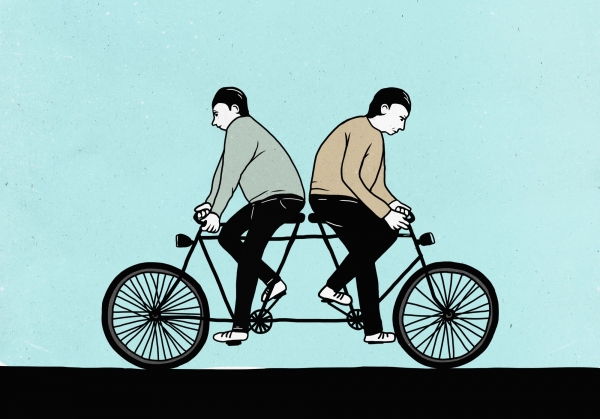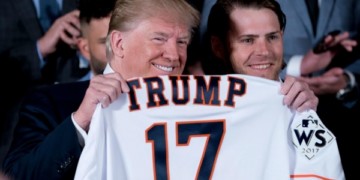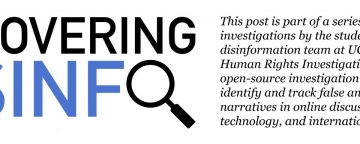
At risk of stating the obvious, people in the United States have become deeply polarized over politics. Pew Research Center reports that this partisan divide has become a chasm. Significantly fewer people hold a mixture of political opinions from both parties compared to years past. Interestingly, the divide between members of different political parties is far wider than the divide between members of different races. The average white person has more in common with the average black person than the average Democrat has in common with the average Republican. This runs counter to some of the loudest voices in our political discourse who are focused primarily on “identity politics.”
The phrase “identity politics” was first introduced in 1977 by a group of black feminists called the Combahee River Collective. In the statement that coined the phrase, three authors (Demita Frazier, Beverly Smith, and Barbara Smith) expounded on ideas from other parts of the feminist movement, accepting some and rejecting others, but their primary focus was on intersectionality: the idea that race, class, sex, gender, and sexuality cannot be cleanly separated and discussed in a vacuum. The experience of being a black woman is not simply the combination of two separate experiences—being black and being a woman—but something more complex.
The Combahee River Collective thought deeply about the ways our identities are political, but they also openly rejected much of the identity-exceptionalism that is associated with modern identity politics:
We have a great deal of criticism and loathing for what men have been socialized to be in this society: what they support, how they act, and how they oppress. But we do not have the misguided notion that it is their maleness, per se—i.e., their biological maleness—that makes them what they are. As Black women we find any type of biological determinism a particularly dangerous and reactionary basis upon which to build a politic. We must also question whether Lesbian separatism is an adequate and progressive political analysis and strategy, even for those who practice it, since it so completely denies any but the sexual sources of women’s oppression, negating the facts of class and race.
Today’s identity politics often involves reductionist thinking about identity on both sides of the coin. Identity politicians on the left suggest that experiences of marginalization are entirely inaccessible to white people or men (and definitely to white men). Simultaneously, they seem to assert that one person’s experience as a woman or a person of color is enough to speak authoritatively on behalf of other people who share those traits.
By reacting to our worst assumptions about others, we give them good reasons to assume the worst in us.
In this paradigm, white men are especially blinded by their privilege, which renders their thoughts and opinions invalid in any contexts related to oppression. Similarly, the thoughts and ideas of people of color are deemed automatically correct, regardless of the content of those ideas. This is a significant departure from the Combahee River Collective’s original position as Kimberly Foster noted in The Guardian:
Identity politics become flimsy when they devolve into shallow back-and-forths that conflate lived experience with sound political analysis. A worldview that moves us closer to equality doesn’t stem from living in a certain kind of body. It emerges from pursuing a certain kind of politics.
When identities can be invoked to assert an unquestionable authority, marginalized people can get by making dubious or completely false claims because of their “lived experience.”
But identity politics isn’t only rising on the left, and the far right’s version of identity politics is much more troubling. The so-called “alt-right” has gone so far as calling for an ethnostate—an America just for white people. Obviously, calls for ethnic cleansing are much worse than being a little closed-minded about the opinions of white dudes or overly enthusiastic about opinions just because they came from a marginalized person. Still, both of these attitudes reflect the growing tribalism in the United States, which is growing in a kind of self-perpetuating feedback loop.
The Identity Arms Race and… Race
The existence of loud, polarized views on both sides helps to perpetuate the division in a kind of ideological arms race. Increasingly, our public discourse reflects our worst fears and assumptions about people who don’t necessarily look or act like us. By reacting to our worst assumptions about others, we give them good reasons to assume the worst in us. The tension is escalating, the stakes are getting higher, and most of us are retreating further into the bunkers of our own tribes. This is the modern culture war—a rhetorical arms race pushing us further away from mutual understanding.
Terms like white privilege, toxic masculinity, and white fragility stem from the identity-driven left. While much of their usage is intended to highlight actual phenomena, many people use them as a sword rather than a spotlight. “Check your privilege,” started as a reminder that not everyone has the same experience with—for example—the police; but “You’re privileged” has become a flippant way to dismiss the opinions of someone born with certain identity characteristics.
Nevertheless, racial discrimination is a fixture of the U.S. justice system from end to end. As a result, Americans of color face that discrimination from the cradle to the grave—a grave they are sent to disproportionately by said legal system. The people living through this oppression, which is largely (though not entirely) enacted by white men, are understandably frustrated and skeptical regarding both white people and men as groups.
This isn’t new. Back in 1977, the Combahee River Collective had already noted that:
as children we realized that we were different from boys and that we were treated differently. For example, we were told in the same breath to be quiet both for the sake of being “ladylike” and to make us less objectionable in the eyes of white people. As we grew older we became aware of the threat of physical and sexual abuse by men. […] We are all damaged people merely by virtue of being Black women.
Unfortunately, the most flippant expressions of this exasperation in the public discourse—such as tongue-in-cheek suggestions that we #KillAllMen or #CancelWhitePeople—are easily weaponized by the members of the identity-obsessed right.
Provocateurs like Milo Yiannopoulos and Steve Bannon use this kind of language to stoke people’s worst fears about The Other. Partisan outlets spin, obfuscate, and manipulate the intent of these phrases. “Don’t you see what they’re saying?” they warn, “They say that all men are trash, and that white lives don’t matter! Do you want these people to rise to power?”
Reacting to the provocateurs, the identity-driven left point to their most divisive rhetoric and ascribe that exact level of vitriol and anger to everyone who voted for Donald Trump. “You’re a racist if you even considered voting for Donald Trump,” they say, “and I don’t want to hear your justification.”
Both sides have effectively confirmed each other’s worst assumptions and we’re all worse off for it. Nevertheless, this rhetoric probably isn’t going away anytime soon. Reihan Salam points out that anti-white rhetoric is “so commonplace as to be banal,” because it serves a purpose. From signaling solidarity between members of marginalized communities to affirming one’s status as an outsider occupying a mostly white space, most comments denigrating whites are only tangentially about white people. And they are generally not made with whites as the intended audience.
And of course, there are tactical reasons for baiting this rhetoric on the right. Bannon infamously said, “The Democrats, the longer they talk about identity politics, I got ’em. I want them to talk about racism every day. If the left is focused on race and identity, and we go with economic nationalism, we can crush the Democrats.”
The identity-driven right relies on a far-left identity-driven message to perpetuate its own ideology. The recruitment tactics for white nationalists revolve around finding white (typically poor) men who already perceive themselves as victims. They seek out white men who feel that their maleness or whiteness is under attack. They show them solidarity—“you’re right, they hate men”—and then slowly introduce more radical views centered around “empowering” these men to be “proud” of their whiteness and maleness. They will eventually say, “in fact, white men are the best kind of men.” Slowly but surely a Dylann Roof is created.
Admitting we’ve made mistakes in our past is not shameful — it is a sign of growth.
Of course, the Russian trolls play a role too. The strategy of divide and conquer—specifically the strategy of stoking the racial tension that has underscored U.S. history since the start—was outlined in the book The Foundations of Geopolitics. The book is often dismissed as a far-right absurdity, but it is also crucial for those who seek to understand Putin and his administration; after all, it is required reading for Putin’s generals.
The Russian strategy, we now know, involved significant amplification of the most vitriolic rhetoric on both sides of the #BlackLivesMatter debate (among other things). Russian agents impersonated activists on Twitter and originated some of the most troubling rhetoric—trusting our human impulse for outrage to spread the message. And Americans took the bait.
For professor of political science Adolph Reed, the escalation of these race-first attitudes detracts from our ability to make the kinds of alliances that underscore the majority of big political victories. Reed cites Martin Luther King Jr.’s negotiations with Lyndon Johnson during the civil rights era as an example of such alliances. He criticizes Ava DuVernay’s 2014 film Selma—which largely ignored these negotiations and cast Johnson as a kind of obstructionist—as an example of the problematic theme of ignoring real political complications in favor of telling stories that “typically feature singular black heroes who have overcome crushing racist adversity against all odds.”
If we are going to curtail this dangerous polarization, we desperately need to form political alliances like the one King made with Johnson. Those alliances will require us to see ourselves in each other, especially when those similarities are masked by external differences. It will also require us to engage—in good faith—with people we find problematic.
It’s crucial that we brace ourselves against essentialism and reductionism. Every Trump voter isn’t a card-carrying member of the KKK. Every “social justice warrior” doesn’t want to kill all men. We are all complex. We are all flawed. We are all ignorant to some things and experienced in others. We have more in common than those sowing an identity-only politics would have you believe.
We Are All Multitudes in This Together
I am the perfect model of the identity-first left’s opposition. I am white, male, cisgender, heterosexual, economically upper-class (both as a child and now), and I work in technology. I defy you to find someone more privileged. Yet, if these identity markers are meant to define my worldview, I am a traitor.
I began to leave the Mormon church when I was about 14. This was my first rejection of an identity I had effectively been born into. My decision to leave the church was kickstarted by the church’s (very negative) views on homosexuality. Through high school debate, I began exploring feminism and my views on the church soured further. As I came to identify as a feminist, and as pro-LGBTQ, I became alienated from the circles that had previously defined my identity—eventually I became an apostate.
I betray my economic peers consistently at the voting booth, where I cast my ballot to increase my own tax rate, expand the social safety net, socialize our health care system, expand public education programs, and more. The system has worked for me, and I am happy to pay it forward through my taxes.
I’ve never felt particularly masculine—I’m thin, slender, and have almost always preferred to wear my hair long. I’ve enjoyed dressing in drag from time to time. I still identify as a man, but when people talk about “manly” men, I have always understood they probably aren’t talking about me.
Recently, one aspect of my life has been weighing on me heavily: I’ve been sexually assaulted twice. Both times by men. When the flood of women in my life shared their assault and harassment experiences on social media, I saw so much of my own experience in these women’s stories. I, too, wanted to say #MeToo, but I feared what would happen if I did. I witnessed the tear-down of one man who did use the hashtag, and I understand why: This is a movement about women, their history of oppression, and their experiences.
At the same time, I felt (and still feel) this is an enormous missed opportunity for women to find solidarity with men and a missed opportunity to empower men to talk freely about the sometimes terrible behavior of other men. The day Brett Kavanaugh was confirmed to the Supreme Court, I sobbed alone in my bed. I shared the feelings that the women in my life were talking about, but I did not feel welcome to share my experience. The castigation of the few other men I saw #MeToo-ing made me feel as if—as a man—I was not entitled to those feelings.
Once, after sharing my stories, I was told that it reinforced ugly stereotypes against the gay community. My privilege rendered me, in this person’s view, incapable of being a victim. The real victim was the gay community, which I was “slandering.” Moreover, a gay man—who holds a less privileged position in society—could not possibly have assaulted someone who so clearly embodies the identity of the oppressor. Having cast aside my religious identity largely in solidarity with the gay community, that response stung. It also gave me a great deal of empathy for the women who come forward and are not believed.
My criticism here is not of feminism, #MeToo, or those fighting for social justice in general. In any sufficiently large group, there are people you disagree with—that’s just the way it works. For white men, when you’re disinvited from participating in some social justice circles because you’re too privileged, just shake it off. If the world is going to get better, white folks have a lot of work to do; we can’t get bogged down feeling bad for ourselves. We have all witnessed racism, sexism, heterosexism, and all the other -isms; our privilege allows us to rarely (essentially never) be on the receiving end of these. Because we aren’t the target, many of us don’t even notice the bad behavior. If every white man started publicly calling out one instance of prejudice they witness each week, I contend that the world would be a remarkably different place (especially if we interrogated our own behavior). Isms are perpetuated because there is rarely a social consequence—indeed, there is often a reward—for engaging in prejudiced behaviors large and small.
White men must raise our own awareness and use the privileges afforded us to hold other privileged people accountable. I can look back on my own life and see so many ways the circumstances of my birth gave me several thousand legs up. From my education, to a stable home, to a safe neighborhood, to some very breezy interactions with the legal system. I have lived a charmed life, and I will continue to advocate as best I can for a future where everyone has a chance to live the kind of life my privilege afforded me.
It is also on us to do the painful work of examining our own participation in systems of prejudice. Admitting we’ve made mistakes in our past is not shameful—it is a sign of growth. Your own reckoning doesn’t have to be public, but it does have to happen. Forgive yourself, ask forgiveness from those you have wronged (but know that they are not obliged to give it to you), and pledge to do better in the future. It really is that simple.
Everyone is a complex, tangled mess of experiences. We have all lived through struggle, hardship, and good times. We have all been victims and we have all been perpetrators. Shouting down at each other from the moral high ground contributes to the polarizing rhetorical arms race that is dividing us into political tribes and rarely does much to improve things.
When we wield identity-first arguments as a weapon, we invite defensiveness. We create closed minds in people we desperately need to open up. If we want to move through this period of polarization, each of us needs to work hard at keeping an open mind and not becoming defensive. In an age when whatever we say might be blasted (without its context) to an audience of thousands-to-millions, we must remember that we do not get to choose how others interpret our words, so we must choose them carefully.
Fertile Ground for Alliances—Bring Class Back into It
To a poor white family living paycheck to paycheck with no intergenerational wealth to speak of, being white doesn’t feel like much of a privilege. This is especially true if their community is mostly white because they don’t have a frame of reference for racial disparity. This feeling isn’t fact. If that family’s skin turned black tomorrow, they would be worse off in America, but as an impoverished white family, they’re still members of a marginalized community. When wealthy, well-educated people of color tell the powerless white underclass their whiteness automatically elevates them to the highest reaches of privilege, that’s still punching down.
White elites do this all the time. “White trash,” “redneck,” and “hillbilly” are all classist slurs that underscore a longstanding American tradition of keeping the poor where they are. For an enlightened outsider, it might be easy to see the additional impact the construct of race would have—but this race to the bottom plays right into the hands of those who want to divide and conquer.
The class struggle of the white working-class could easily become married to the same economic struggle that people of color are disproportionately in—but that alliance has to be based on commonality and shared goals. Instead, reacting to the racist message of the identity-first right, the identity-first left condescendingly tells poor white Americans they are racists who already have it made. Their whiteness is the only privilege they need to succeed. Their current plight must be the result of their own failures. This is the racial rhetoric Bannon and his ilk love. The identity-driven right counters the message by saying, “Just embrace it. They already think you’re racist and privileged. We can help you get the privilege. All you have to do is embrace the racism.”
But the people who benefit most from the animus between working-class whites and working-class people of color are the plutocrats. There is no good reason the working-class can’t make America great through the solidarity of workers and the impoverished. It will involve overcoming some of these racist attitudes, but when communities come together to solve a shared problem, they grow to understand each other better.
Prejudiced as they may be, poor white communities and poor black communities are being ravaged by many of the same problems created by the same people. The opioid crisis, stagnant wages, wealth extraction by profiteering elites, continued economic stratification and income inequality, lack of access to health care and a social safety net, poor educational infrastructure, and isolation from good job/networking opportunities keep poor people down regardless of their race.
Poor urban communities (disproportionately communities of color) are facing gentrification and slumlords who are extracting money through forced evictions and horrible accommodations. Poor white communities (disproportionately rural) are facing ecological destruction from fracking and oil spills like Deepwater Horizon, which have literally poisoned their food and income source, making the land unlivable. Crony capitalism empowers this exploitation in both communities.
The unique race-based problems that people of color face that white people do not can be brought to light during a collaboration against economic inequality. Starting with common ground will give white people some much-needed firsthand contact with people of color. Seeing that they have more in common with people who were previously “other” to them will be a much more compelling reason to join in the struggle for racial equality than patronizing tweets from strangers.
Research repeatedly confirms that confrontational, shame-based approaches to changing attitudes do not work, especially if those confrontations involve attacking someone’s identity. Saying, “you are a racist,” is a surefire way to get a person to dig in their heels. Saying “what you just said was racist,” is a minor improvement, but resisting the urge to attack and inviting empathy works better than either.
Of course, if you’re imagining having this conversation with a tiki torch-wielding anti-Semite, you might consider if they’re a bit too far gone. Fair enough, but if this is your mental model of the “average Trump voter,” you are displaying some implicit bias of your own.
Empathy is a two-way street. For the sake of our future, we desperately need to start seeing more of ourselves in people that don’t look familiar at first glance. We will only do that through good-faith attempts to understand the people who confound us. In reality, few people are genuinely too stupid or too malicious to change. The political class isn’t helping us. The hate-monger-in-chief has set the tone for our troubling political discourse, and too many of his supporters have taken his cues—but so have many of his opponents.
The work of winning hearts and minds will take a lot of time, effort, and restraint. It won’t be easy and it won’t be comfortable. It will be frustrating to hold ourselves to a higher standard while the standard bearer of the other side spouts off from a bully pulpit. But the authoritarians and white nationalists win when America tears itself apart. If that happens, things will get much much worse for already hurting and vulnerable communities. We need to pull America together before it’s too late.
85 claps

























Connect with us